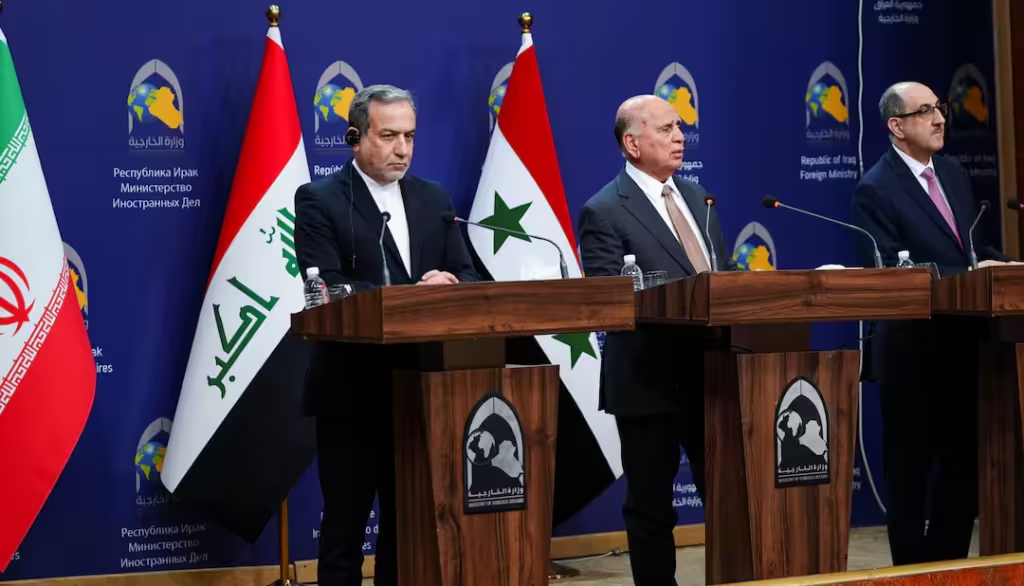Iraqi Shi’ite political groups and armed factions are deliberating whether to intervene in Syria as Sunni Islamist rebels, led by Hayat Tahrir al-Sham (HTS), make significant territorial gains. The rebels, who have captured two Syrian cities and are approaching a third, pose a strategic challenge that Baghdad views with alarm.
Historical Tensions and Present Concerns
The memory of Syria-based Sunni fighters wreaking havoc in Iraq remains fresh. After the 2003 U.S. invasion, thousands of Sunni insurgents crossed into Iraq, fueling sectarian violence. Many of these fighters reemerged in 2013 under the Islamic State banner, conquering large swathes of Iraq before being pushed back.
Although HTS has renounced ties to Al Qaeda and Islamic State, Iraqi leadership remains deeply suspicious. The rebels have stated they have no designs on Iraq, but officials in Baghdad remain unconvinced.
Defensive Posture for Now
Iraq has stationed thousands of troops, including conventional forces and the Iran-aligned Popular Mobilization Forces (PMF), along its border with Syria. Thus far, their orders are limited to defensive operations rather than assisting Syrian President Bashar al-Assad. However, the calculus could shift if critical events, such as the fall of Homs, Assad’s removal, or sectarian persecution, materialize, according to Iraqi officials and regional diplomats.
Government spokesperson Bassem Al-Awadi has stated that Iraq is not pursuing military intervention but emphasized that Syria’s division is a “red line” for Iraq. This measured stance reflects Baghdad’s broader aim of avoiding entanglement in regional conflicts while focusing on domestic reconstruction efforts.
A Fragile Balancing Act
Prime Minister Mohammed Shia al-Sudani, a moderate leader, has been cautious about becoming embroiled in escalating regional tensions, including those linked to the Gaza conflict. His administration’s policy has been to remain neutral, with PMF leader Falih al-Fayadh echoing this sentiment during a televised speech. However, Fayadh warned, “It is not wise for there to be a fire in your neighbor’s house while you sleep, reassured without thinking of what might happen.”
Iraq’s Strategic Position in the Region
As part of Iran’s Axis of Resistance, which includes Hamas in Gaza and Hezbollah in Lebanon, Iraq holds a critical position. With the latter two forces severely weakened by Israeli offensives, Iraq’s PMF—with its tens of thousands of battle-hardened fighters—represents a powerful asset within the alliance.
However, the Iraqi ruling coalition is divided. Some factions, having fought alongside Assad’s forces in the past, are inclined to reengage in Syria. Others view such actions as potentially destabilizing for Iraq.
Regional Diplomacy and Diverging Agendas
Recent diplomatic engagements reflect the growing complexity of the situation. Iraqi Foreign Minister Fuad Hussein hosted his Syrian and Iranian counterparts in Baghdad, condemning terrorist activities in Syria and receiving pledges of support from Iran. Meanwhile, Abu Mohammad al-Golani, leader of the Syrian rebels and former Al Qaeda affiliate, urged Iraq not to intervene, proposing future economic and strategic ties between the rebels and Iraq should Assad’s regime fall.
Golani’s history complicates matters. Once imprisoned in Iraq for his involvement with Al Qaeda, he later moved to Syria, where he established a franchise of the extremist group before breaking ties in 2016. Despite his stated ideological shift, Iraqi officials remain skeptical.
Uncertain Path Ahead
As regional conflicts intensify, Iraq faces a difficult decision: maintain its defensive stance or intervene militarily in Syria. The outcome of these deliberations could shape not only Iraq’s security but also the broader geopolitical dynamics of the Middle East.



